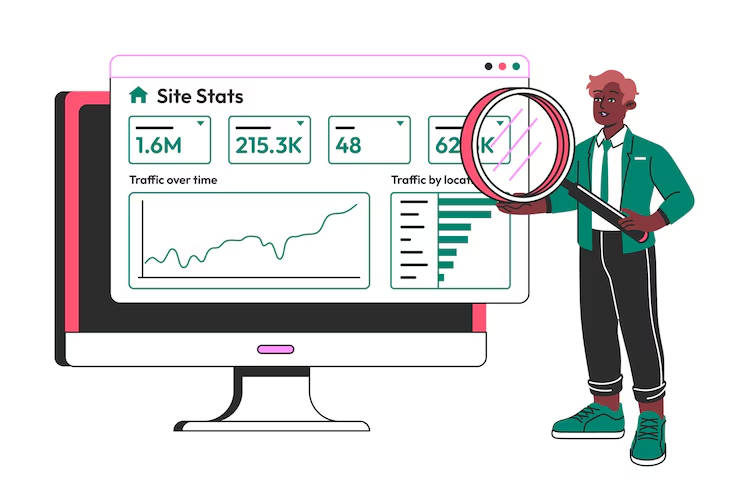In an increasingly digital-first world, a website is a brand’s digital identity, a marketing tool, an e-commerce site, and a customer service centre. For a website to be high-performing, it needs to be tuned regularly to stay at peak performance. Enter the Web's e-Audit. A Website Audit is not a luxury or a one-time act. It’s a fundamental component of an ongoing strategy to keep your website optimised, on the radar in search engines, and still in peak performance. As the competition for organic visibility continues to mature and numerous factors come into play, you can't just perform an audit and walk away.
Your website's SEO health depends on routine audits. It uncovers issues you might not even know exist and helps you better align your business and site with algorithm updates across various search engines.
This blog will examine why regular auditing is crucial for SEO success. It will demonstrate how it can help your digital strategy and explore how new tools such as AI detection are changing how audits are performed today.
The Basics of Auditing a Website
An Audit analyzes our performance, structure, technical issues, and content efficacy. This means assessing everything (broken links, mobile responsiveness, meta tags, keywords, page speed, etc.). It goes beyond the findings of what needs to be fixed, but also which areas of our SEO activity could use improvement and further alignment to
Google's evolving algorithmic search processes. As a newer generation of auditing, rather than just SEO and broken link checks, we now see modern integrations from AI-based tools as an additional method of deeper analysis.
The Role of Website Audits in SEO
Search engines reward fast-loading, mobile-friendly, and secure sites with great content. An outdated or technically broken website can unknowingly undermine your SEO performance. Here's how auditing helps your search engine optimization.
– Identifying Technical SEO Issues
Auditing uncovers hidden problems that can prevent search engines from crawling or indexing your pages. These include:
- Broken internal links
- Redirect chains or loops.
- Missing alt attributes
- Unoptimized images
- Slow-loading pages
Fixing these issues improves crawlability and enhances user experience, both key SEO factors.
– Enhancing On-Page SEO
Auditing a website reveals on-page SEO weaknesses, whether in your meta descriptions, title tags, header tags, content formatting, or elsewhere. Internal linking, content structure, and optimization processes allow search engines to properly rank your web pages' content.
– Improving User Experience (UX)
A good audit will assess responsive design, navigation flow, usability, and more! The more visitors to your website and the lower the bounce rate, the more consistent traffic will be available!
Why is Regular Auditing of Websites Non-Negotiable?
Auditing your website once is not sufficient in today’s fast-paced digital landscape. Here’s why you should care about ongoing audits as a regular part of your process:
– Google Algorithm Updates
Search engines are constantly changing. Something that worked six months ago may no longer work now. A regular audit website online ensures you’re not only in line with your competitors but also allows for updated documents based on changes in search engine algorithms, bringing your overall SEO strategy back into alignment.
– Remain Competitive
If everyone in your niche is conducting an online audit of their website and optimizing it, and you are not doing the same, they will outrank you. Daily, weekly, monthly, and yearly audits are necessary to stay in touch with your market and remain competitive.
– Content Staleness
Your website's rankings may suffer if it contains duplicate or out-of-date information. A regular audit can identify stale content that you can either update or combine with other pages identified as stale. Optimizing the stale content, in turn, improves the relevancy and authority of your content overall.
– Security and Compliance Standards
Website security audits and privacy compliance checks are prudent because of new monetary and security threats arising. A trend shows that privacy compliance, such as GDPR, has gained momentum.
The Rise of AI in Website Auditing
Detection of AI is at the forefront of the rapid evolution of modern SEO technologies. AI-based technologies that can analyze massive datasets, recognize content duplication, predict algorithmic penalties, and even offer content rewrite suggestions enhance today's audits.
– AI Detection in Audits
AI detection tools can scan your web pages to identify auto-generated or low-quality content. This helps businesses maintain originality and avoid penalties from Google’s helpful content system.
– Using AI Content Checker
A content checker AI can evaluate grammar, keyword density, readability, and sentiment. It helps content creators and marketers polish their pages to meet SEO and engagement benchmarks.
These tools bring accuracy, speed, and depth to the auditing process that manual methods simply can’t match.
Elements a Strong Website Audit Should Cover
Here’s a checklist of areas a comprehensive audit should follow to evaluate:
– Technical SEO: Site architecture, crawling errors, indexing, HTTPS, mobile-friendliness, site speed.
– Meta-tags, keyword optimization, header introduction, alt text, and schema markup are all examples of on-page SEO.
– Content Quality: Originality, keyword use, relevant content, readability, AI content detection.
– Anchor texts, domain authority, and backlink profiles are examples of off-page SEO.
– UX & Design: Navigation, layout, accessibility, engagement metrics.
– Security & Compliance: SSL, GDPR compliance, cookie policies.
Engaging human insights and AI-powered tools ensures we will not miss these areas.
How Often Should You Perform a Website Audit?
- Quarterly: For growing businesses that post new content or receive frequent traffic spikes.
- Monthly: For e-commerce sites, news platforms, and SEO-driven brands.
- Post-major updates: After a website redesign, content migration, or Google algorithm update.
Consistency is crucial, but the frequency can change. Schedule audits as part of your ongoing SEO and content calendar.
The Business Impact of Website Audits
Audits aren’t just for digital marketers—they directly impact business outcomes. Some of the most significant benefits include:
- Increased organic traffic through improved visibility
- Higher conversion rates from enhanced UX
- Lower bounce rates due to better performance
- Improved domain authority via optimized content and link structures
- Brand credibility through secure and responsive design
Audits act as a preventive measure that saves time and money in the long run by diagnosing and resolving hidden issues.
Website Audit Works as a Growth Engine
An Audit is your digital health check—identifying what’s working, what’s not, and where to optimize. When done consistently and strategically, audits support SEO and unlock untapped growth opportunities across all digital channels.
Audits are becoming more innovative and impactful with tools like AI detection and AI Content Checker. At SEO Serene, we help businesses like yours harness the full potential of auditing to drive traffic, engagement, and revenue.
Ready to give your website the health check it deserves? Start your next audit today and discover what’s holding your SEO back.






















